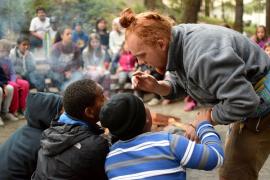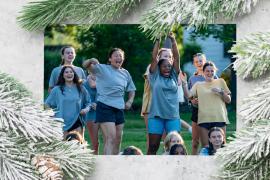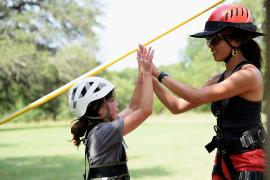‘Tis the season to recruit for summer staff . . . and gee, are we facing challenges! COVID-19 remains a real threat to operations and knowing what is to come this summer. Nonetheless, finding quality summer staff is a must — even if those staffing plans are contingent on what happens with vaccines, state orders, and CDC guidelines.
In-Person Recruiting Alternatives
It’s not surprising that universities have moved from in-person job and internship fairs to virtual fairs. Students still need work experiences and online recruiting is most likely the best option considering today’s circumstances. Universities use a variety of platforms for their virtual job/internship fairs — they include Handshake, Simplicity, EasyVirtualFair, Brazen, and others. Some universities use other types of platforms like Zoom or Google Meet to match up students with potential employers. In any case, the platforms offer similar tools and opportunities to connect with students.
Camps will be able to establish their brand and to create virtual booths similar to those used at in-person job/internship fairs. They can be highly visual to have an immediate impact on the attention of job/internship seekers. Camp pictures, logos, and links to camp social media sites are often on the ‘front end’ of the virtual booth. Typically, multiple recruiters will be allowed to staff a virtual booth allowing for several contacts at one time. Some virtual fair platforms also allow for camp ambassadors to be present — a great way to make use of previous staff as recruiters.
Camps will be able to upload videos, engage in real-time chats, and put potential candidates into separate breakout rooms for individual conversations or to respond to common questions. Interview rooms may be established and scheduled for on-site conversations. Many platforms allow for employers to reach out to registered student attendees in advance, establishing early relationships. Further, camps can search for potential staff by filtering student attendees by major, area of interest, and keywords that students might include on their resumes.
In terms of how students search for employers at virtual job/internship fairs, they too have the ability to filter employers by what interests them. It is uncommon for students to “just wander around” like they might do at an in-person job/internship fair. Basic filters students use include things like job title, job function, type of industry, and by names of specific employers. In addition, students search for potential employer matches through the use of keywords, employer preferences, and location. Some will even search by organizations that seem to best match their college major or are seeking students from a particular major.
Virtual Recruiting Considerations
So, what can a camp do to engage and recruit staff at virtual job fairs? Several best practices have been identified to make contact with the types of people you are seeking. They include:
- Know the types of people you want before creating the virtual booth/employer information page
- Ensure that the keywords used to define your camp include words like leadership, making a difference/having an impact/rewarding work, commitment to DEI, lifelong learning; list college majors that could be a match to what you are looking for
- Include “day in the life” video snippets of what it is like to work at camp
- Include written as well as audio or video staff quotes about why they work at camp (quotes from previous staff or business leaders who attest to the value of working at camp and how it set them up for success can be helpful)
- Make use of virtual camp ambassadors — other students that potential new staff can connect with either during the virtual fair or at a later time
- Use 30- to 60-second videos that highlight the benefits of working at camp
- Gamify the virtual fair experience — consider creating a virtual scavenger hunt with swag prizes to be mailed later or trivia boards to help students get to know your camp
- Think of FAQs in advance and provide answers to those on your employer information page
- Include materials that students can download and look at later — those might include application forms, URLs of your camp webpage and social media links, videos up to five minutes in length, contact information of previous staff as well as who to contact for additional information, previous staff testimonials, and related sources of information
- Use breakout rooms with themes — ask me anything, workplace culture, the value of working at camp (preparing for any career) – for students to select and get more information about specific areas
- And, of course, follow up with those who “stopped by the booth” or those you found using your keyword search
Internships
Some camps may be interested in a couple of other recruitment approaches — one is to establish internships. Internships are important for almost every major — from business to videography/marketing to recreation to education, and others in between. There are actually three different types of field experiences that students often need or seek as part of their college education. They include independent studies, practicums, and internships. Each of them is different from the others and universities use the terminology in different ways.
The good news is that the ACA Staff Recruitment and Retention Committee, through its Project Real Job (PRJ) initiative, has created some information sheets that outline the common distinctions. In addition, if a camp is interested in establishing formal internship experiences PRJ offers information related to that as well as a template to create an internship manual.
Staff Recruitment and Retention Downloadable Handouts
Diverse Staff
The last tip of this blog is to aid with the search for diverse staff. We know that camps struggle to find staff who are African-American (as well as other racial minority groups) — one suggestion to reach such audiences would be to contact student groups and/or faculty at Historically Black Colleges and Universities (HBCUs). A list of HBCUs across the country may be found at thehundred-seven.org/hbculist.html
This blog was written on behalf of Project Real Job’s efforts to help camps recruit, hire, and retain staff.
Deb Jordan, ReD, is a professor in the Department of Recreation Sciences at East Carolina University. She serves on the LCOL of the Southeastern Field Office as co-chair of Standards; she is also the co-chair of the ACA Staff Recruitment and Retention Committee. Deb has worked at all levels of camp, written three textbooks, and conducts trainings across the country related leadership; group dynamics; evaluation processes; and diversity, equity, and inclusion.
The views and opinions expressed by contributors are their own and do not necessarily reflect the views of the American Camp Association or ACA employees.




